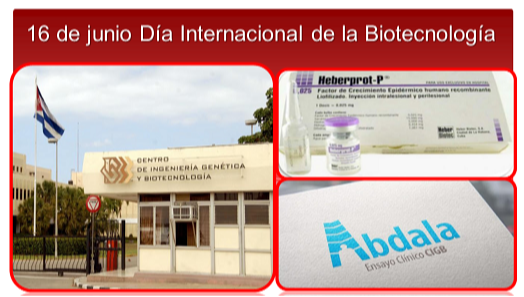
Illustrative image taken from FB of the Ministry of Justice.
By María Josefina Arce
Every June 16, the International Biotechnology Day is celebrated, which in Cuba has undoubtedly had a notable development, given the importance given to it by the authorities to protect the health of the people and the growth of the economy.
To refer to the advancement of this branch of science in our country is to refer to the love of their profession, sacrifice and high capacity of numerous men and women who have made possible new medications, which today are recognized internationally for their effectiveness and safety.
In many cases, they are anonymous heroes who, from different scientific disciplines, daily overcome the obstacles imposed by the current complex situation, aggravated by the tightening of Washington's blockade and the illegal and arbitrary inclusion of Cuba on the list of countries supposedly sponsoring terrorism.
The dedication of our scientific community was essential in the battle waged by the nation against COVID 19. Thanks to their incessant work, Cubans, including children, were able to be immunized against the virus with their own vaccines.
This was another milestone of Cuban biotechnology, which decades before with the obtaining of the well-known interferon saved countless lives, in the face of the hemorrhagic dengue epidemic, introduced into our territory by the CIA, Central Intelligence Agency, of the United States, as part of its undeclared war against Cuba.
Although Cuban biotechnology stands out in the health sector, it is also present in other sectors of the country's socioeconomic life. The effort deployed has borne fruit with the obtaining of more resilient plants, biofertilizers and biopesticides.
In its constant struggle to minimize the harmful effects of the US economic siege, vaccines have been achieved in the veterinary field, including one created against ticks and one against swine cholera.
The Caribbean nation has prestigious scientific institutions such as the Center for Molecular Immunology, the Finlay Vaccine Institute and the Center for Genetic Engineering and Biotechnology, which have contributed so much in all these years to the health of Cubans and citizens of other latitudes.
That today Cuba is a world reference in biotechnology has its genesis in the vision of the future of the historical leader of the Cuban revolution, Fidel Castro, and in his commitment and constant battle for the development of science.
Fidel stated that independence depends on technology and science in today's world. Hence, the development of different scientific disciplines and their involvement in the search for solutions to various problems that affect the country is a priority for the authorities, an aspect that the Cuban president, Miguel Díaz Canel, has insisted on.

